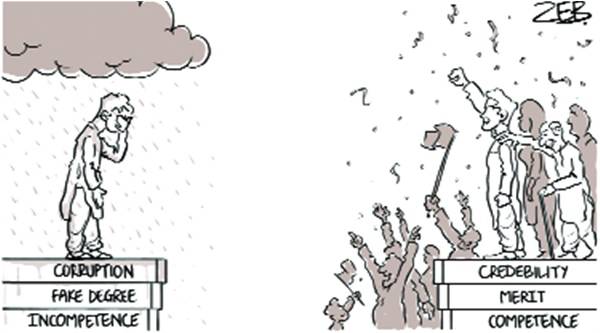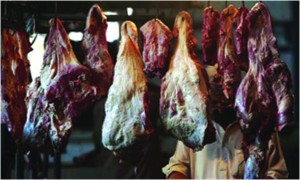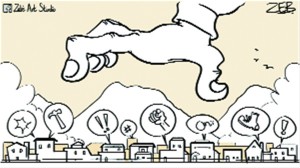
Wakeup call
Sir,
The people of Lahore and Okara have made it clear on behalf of the rest of Punjab that the choice of candidate, his or her credibility and track record matter as much as party tickets. The recent by-election has this message to give: that money and power alone cannot buy votes, and that the land mafia and massive corruption have had an adverse impact on the lives of ordinary citizens. What should have been a walkover for the PML-N in Punjab became a struggle, even to retain their seat. This means that all is not well where the party’s governance and performance is concerned. Building roads and bridges in Lahore or a metro system – otherwise a good project – alone cannot buy the hearts and minds of people. As for Sardar Ayaz Sadiq’s marginal victory, it merely reflects people’s disillusionment with those MNAs and MPAs who abandon their constituents after an election.
Sadiq has won with a margin of just around 4,000 votes from NA144, defeating his opponent, a controversial property tycoon. In the same constituency from Lahore, PP147, the PTI’s Shoaib Siddiqi has defeated PML-N’s Mohsin Latif (Kulsoom Nawaz’s nephew) by almost 2,500 votes. In Okara, an independent candidate, Riaz ul Haq, has inflicted a crushing defeat on PML-N’s Chaudhry Arif, the son of an MNA who was disqualified for having a fake degree; the PTI’s choice of Ashraf Sohna, a defector from the PPP who had his security confiscated, came fourth. The people of Okara have clearly endorsed this disqualification.
The PML-N must look beyond its Kashmiri clan and give preference to merit, competence and credibility if they aspire to victory in 2018. Imran Khan has a following in Punjab, but he cannot take them for granted. He must now walk the talk, which should be reflected in his choice of candidates and his role in the opposition by focusing on issues of public interest.
Malik Tariq,
Lahore.
Mina tragedy
Sir,
Some two million people perform the Hajj every year. In the tragedy that struck innocent pilgrims at Mina on 22 September 2015, at least 1,200 people died in a stampede, while about the same number were injured. The incident took place on Street 204 of the camp city at Mina, a few kilometers east of Mecca, where pilgrims stay for several days during the culmination of their journey. Street 204 is one of the two main arteries leading through the camp to Jamarat, where pilgrims ritually stone a representation of the devil.
While similar stampedes have taken place, during which many people have lost their lives, the incident that occurred on 22 September – claiming 89 Pakistanis of the 1,200 casualties – has broken all records. This makes it essential for the Saudi government to adopt immediate and long-term measures that would eliminate, or at least minimize, the possibility of such a tragedy reoccurring. One way to achieve this would be to drastically cut down (at least by 50%) the total number of Hajj pilgrims visiting the country every year. An additional step could be to impose a ban on pilgrims who have already performed the Hajj once and give preference to those who have not done so. Will the Government of Saudi Arabia look into the matter seriously to avoid similar incidents of this scale in the future?
M. Fazal Elahi,
Islamabad.

Meat vendors
Sir,
It is disillusioning to see that meat vendors in Pakistan have no compunctions about exploiting consumers by selling haraam meat. On a recent inspection, the food authorities discovered that a number of vendors had mixed pork or horsemeat with mutton and beef. This is tantamount to playing with consumers’ health, given that pork and horsemeat are considered unlawful in Islam. Moreover, the practice clearly violates Islamic rulings, which call for justice and fairness in business dealings and, in this case, require that traders and vendors should supply fresh, halaal and hygienic edibles to consumers.
The government should adopt a stringent mechanism to rectify this anomaly, for example, by sealing off such shops and heavily fining and/or arresting vendors found to be selling such meat to their customers.
Aiyza Javaid,
Lahore.

Tracing remittances
Sir,
The World Bank reports that over $4.6 billion was remitted from Pakistan to India in 2014. This needs to be thoroughly probed instead of being dismissed by the State Bank. Every Pakistani government cites favorable World Bank, IMF and ADB reports to project their self-claimed achievements, but dismisses them when they are not favorable. Why has no Senator or MNA from the opposition taken up this matter?
The State Bank of Pakistan should publish details of all remittances coming into Pakistan along with all outflows. If this World Bank report is correct, it means there are either Indian nationals working in Pakistan, some of who may have acquired an NIC, or that the loophole of allowing foreign passport or dual nationality holders to remit their earnings to countries where their families reside is being abused by vested interests. In any case, it is time that Pakistani citizens holding no other passport be given preference for employment in state-owned corporations, with dual nationals being considered only if there is no other citizen available with similar qualifications.
Over $16 billion is remitted annually through official channels by thousands of our nationals employed in the Gulf, Middle East and Southeast Asia to support their families back home. A near similar amount is funneled out of the country by the few hundred that hold executive assignments in state-owned corporations. As long as individuals with split loyalties hold key executive posts in the State Bank, National Bank, Office of the Auditor General, Ministry of Finance and Foreign Office, among others, loopholes will exist enabling the organized flight of capital from Pakistan and our economy will continue to bleed while our financial custodians look the other way.
M. Tariq Ali,
Lahore.

PCB lab
Sir,
Recently, the Pakistan Cricket Board (PCB) chairman Shahryar Khan, responding to a question on Bilal Asif’s suspect bowling, admitted that responsibility lay with the domestic umpires, referees and others. He also said that the PCB had had doubts about Bilal’s bowling action, but hoped that his arm bend would not exceed the 15-degree limit.
I suggest the PCB take serious action in this regard, such as penalizing domestic umpires and referees. It is unacceptable for the Board to allow such bowlers to play at international level, especially when the PCB itself doubts their competence. A useful measure would be to build an International Cricket Council-accredited lab (as in Chennai, India) so that no Pakistani bowler has to face the issue of suspect action at the international level.
Mubashir Mahmood,
Karachi.
CDA antics
Sir,
The CDA has recently started an operation against commercial enterprises operating in the residential areas of Islamabad. The timing of this operation could not be worse. It is being carried out at a time when the economy is in shambles. When terrorist attacks and poor law and order have caused most foreign investment to dry up. When hardly any Western foreigners are visible on the streets of Islamabad. When unemployment is at its highest. Now the CDA wants to add to this miserable situation by sealing off people’s properties. Is it possible to shift thousands of such businesses to commercial locations within the span of a week? Is enough space available in Islamabad’s commercial centers to accommodate these businesses?
This is a humanitarian issue: the government needs to intervene and inform the Supreme Court and CDA that enabling people to earn their bread and butter is more important than implementing a law that is of no consequence to the ordinary citizen. Implementing such a law in a hurry will have adverse consequences for employment, the economy and tax collection. All such measures can be postponed till the economy is back on track, till foreign investors are willing to return, and till law and order is completely under control.
It has taken Islamabad 40–50 years to get to where it is today. Why should all this be undone in a year or two? Is it a sensible decision? Please act prudently, whether you are a judge, a bureaucrat or a politician. Have mercy on the people of Islamabad.
P. S. Ahmad,
Islamabad.

Muslim solution
Sir,
The current global environment of distrust of the Muslim world is not merely due to the violence and terrorism associated with Muslims. There are a number of reasons for this, which the Muslim community should examine and address.
First and foremost, Muslims should recognize that an interpretation of Islam that is more human rights-friendly is closer to modern thought and democracy than other faiths. Second, as long as Sunni Saudi Arabia and Shia Iran continue to oppose each other, neither will be capable of providing leadership or unity to the Muslim world. Thus, Muslims should consider looking to other countries to play this role. Here, Palestine could serve as a key bond. The Palestinians’ long history of repression by Israel commands respect and sympathy among Muslims across the world. More important are US interests in the region. As the world’s predominant economic and military power and with a vested interest in Israel’s wellbeing, the US has reason to want a solution to the Palestine and Syria crises. If the Palestine solution could be framed in conjunction with the Syrian solution, this would help resolve other problems being faced by Muslims in other parts of the world. For this, they must persuade the Palestinians to agree to such a solution through UNPKF and MESI.
After so much bloodshed and suffering, the Arab Spring should not be allowed to fail. With wide powers given to the UN Election Commission during the elections in Syria, the Muslim community should persuade the US not to give up when success is so close. The UN should be asked to make provision for volunteers from UN-registered human rights NGOs, who will likely come in large numbers from South Asia and the Southeast Muslim countries, to help bring peace and stability to Syria. This would also reduce the financial burden on UN peacekeeping programs in Syria and later in the rest of the Middle East. The Muslim world will also have to motivate the Palestinians to agree to a one-state solution with suitable modifications in their interest. Many Palestinians are now inclined to reject propaganda from Israel and the West in favor of a two-state solution. A useful measure could be to launch a registered lobbying forum in the US for interested people to lobby for the Palestinian cause.
Hem Raj Jain,
Jefferson City, MO.

Karachi factory fire
Sir,
IndustriALL Global Union, UNI Global Union and the Clean Clothes Campaign reject [the German retailer] KiK’s assertions in its recent statement and its attempts to obfuscate issues related to compensation for the victims of the Ali Enterprises factory fire in Pakistan. We would like to clarify that, in the aftermath of the disaster, an immediate relief fund was set up in order to provide emergency assistance to the survivors’ and victims’ families. The fund acquired US$ 1.7 million in total, including the US$1 million from KiK, which was distributed to the victims’ families by the Commission established by the Sindh High Court. KiK’s claim that the victims received several million dollars is, therefore, incorrect.
KiK signed a Memorandum of Understanding (MOU) on 21 December 2012, agreeing to contribute towards the immediate relief fund as well as enter into mutual negotiations to pay long-term compensation to all the affected individuals. We welcome KiK’s proposal for compensation for loss of income and medical costs based on ILO Convention 121, which KiK initially rejected. However, it is crucial that it comes with the necessary financial commitment and is adapted to the specific national context of Pakistan, for which we could use the technical assistance of the ILO. The ongoing court case filed by four victims against KiK in Germany does not cover all victims and covers different losses from those in ILO Convention 121. Therefore, the court case does not release KiK from its responsibility to negotiate long-term compensation as set out in the MOU signed by the company.
In its press release, KiK also refers to the Bangladesh Accord as a sign of their commitment to high safety standards. While we do support this groundbreaking agreement, we do not see how it results in any improvement for suppliers in Pakistan. KiK must remember the bigger picture – that more than 250 workers lost their lives in a preventable tragedy and 55 more were severely injured. These people were parents, children, siblings and loved ones.
We therefore invite KiK to return to the negotiating table in good faith and reach an agreement to pay long-term compensation to all victims, including those who have filed legal cases, without further delay. We also call on KiK to develop a robust strategy to prevent such accidents from happening again.
Petra Brannmark,
Berlin.

